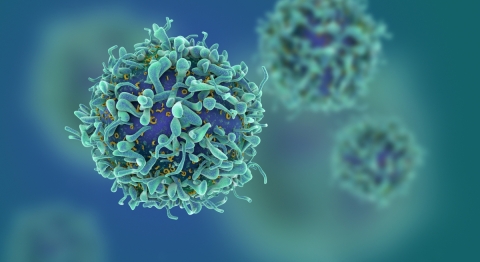Vivace Therapeutics has presented what it said was the first proof of concept clinical data for a cancer drug targeting the Hippo-YAP pathway at the American Association for Cancer Research (AACR) Annual Meeting 2023.

Vivace said the data from its Phase I trial (NCT04665206) showed that its lead candidate VT3989 had achieved durable anti-tumor responses in patients with advanced malignant mesothelioma and other tumors with neurofibromatosis 2 (NF2) mutations, according to an abstract (CT006) of study results posted on the AACR annual meeting website.
Seven of 69 patients showed reductions in tumor size meeting the criteria for being partial responses that persisted up to 21 months. Of those seven, six were in patients with mesothelioma; the other response was in a sarcoma patient with an NF2 mutation, Vivace said.
According to Vivace, 34 other patients showed stable disease following treatment with VT3989, a transcriptional enhanced associate domain (TEAD) autopalmitoylation inhibitor that according to Vivace is first-in-class. Tumor response was seen both in patients with mesothelioma, with and without NF2 mutations, as well as in other solid tumor indications with NF2 mutations.
Of the 69 patients presented, 43 had advanced malignant mesothelioma and 26 had other solid tumors. Patients were heavily pre-treated with a median of three prior lines of therapy. A total of 37 patients had NF2 mutations.
Ongoing dose optimization cohorts of the study are investigating different doses and schedules in two-stage designs, the company said.
“These are encouraging results that provide the first clinical proof of concept for drugging the Hippo-YAP-TEAD pathway,” Timothy A. Yap, MD, PhD, of the University of Texas MD Anderson Cancer Center said in a statement. Yap presented Vivace’s findings on VT3989 during an oral plenary session at AACR’s Annual Meeting, held in Orlando.
Tumor shrinking approach
“Preclinical data suggested that blocking the YAP-TEAD interaction could shrink tumors, and these clinical data validate that approach,” Yap added. “These are early clinical trial data, but we look forward to future results from this trial and continuing to investigate the benefits to patients.”

The Phase I study is a multi-center, open-label trial designed to evaluate the safety, tolerability, pharmacokinetics, and biological activity of VT3989 in patients with refractory metastatic solid tumors, including refractory pleural malignant mesothelioma.
The study includes both a dose escalation and a dose expansion phase, the latter of which is enrolling mesothelioma patients who have tumors with or without NF2 mutations, Vivace said.
VT3989 was well tolerated with no dose-limiting toxicities seen. Vivace said its study showed one possibly related grade 4 cardiomyopathy and seven grade 3 adverse events that were possibly treatment-related, including cases of albuminuria, swelling, fatigue, and increased liver enzymes alanine transaminase and aspartate aminotransferase.
“Based on this initial successful translation of preclinical data into humans, we now have high levels of confidence in a registrational path for VT3989 as a single agent in mesothelioma as well as in combination with targeted therapies to expand utility into major solid tumors,” Vivace CEO Sofie Qiao, PhD, stated.
Privately-held Vivace is an oncology-focused small molecule drug developer that is based in San Mateo, CA, and has raised $70 million in financing to date. Its U.S. and Chinese investors include Canaan Partners, WuXi Healthcare Ventures, Cenova Capital, Sequoia Capital China, Boxer Capital, and RA Capital Management.
Vivace’s YAP-TEAD transcription activity inhibitors are designed to target the Hippo-YAP pathway, which has been shown to be involved in the regulation of cell proliferation, programmed cell death, and cell migration. The pathway controls tissue regeneration and the size and shape of organs when healthy. However, mutations of the Hippo-YAP pathway can be oncogenic and be the dominant driver for several forms of cancer that include mesothelioma, meningioma, and schwannoma.
Dysfunction of the Hippo–YAP pathway also contributes to a variety of cancers including lung, gastric, colon, cervical, ovarian, breast, melanoma, hepatocellular carcinoma, and squamous cell carcinoma.
YAP–TEAD inhibitors could also have broad implications in non-oncology indications such as fibrotic disease, Vivace added.


